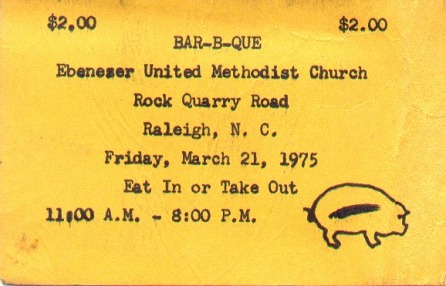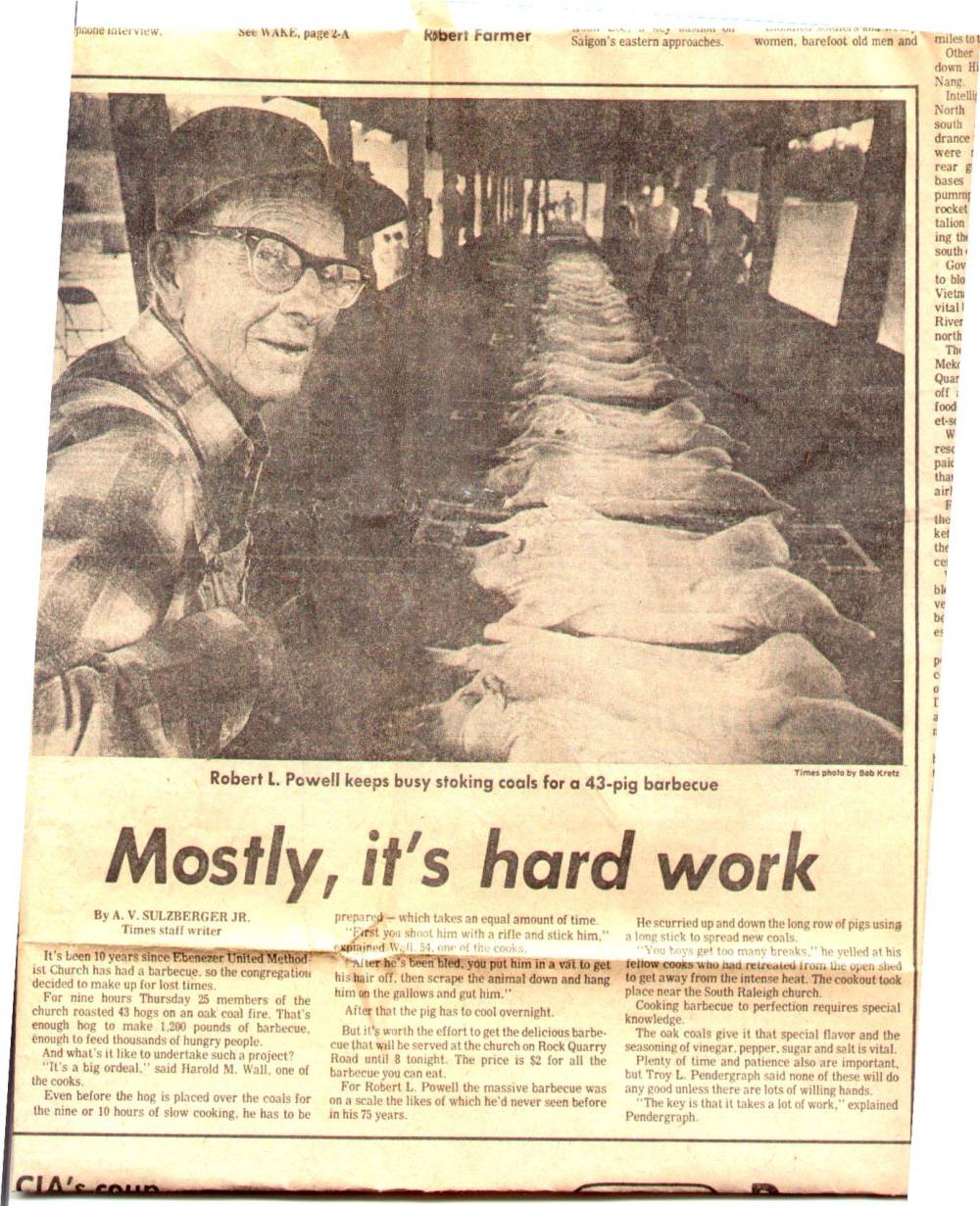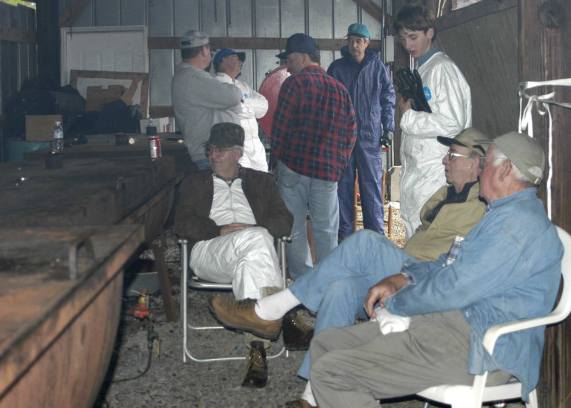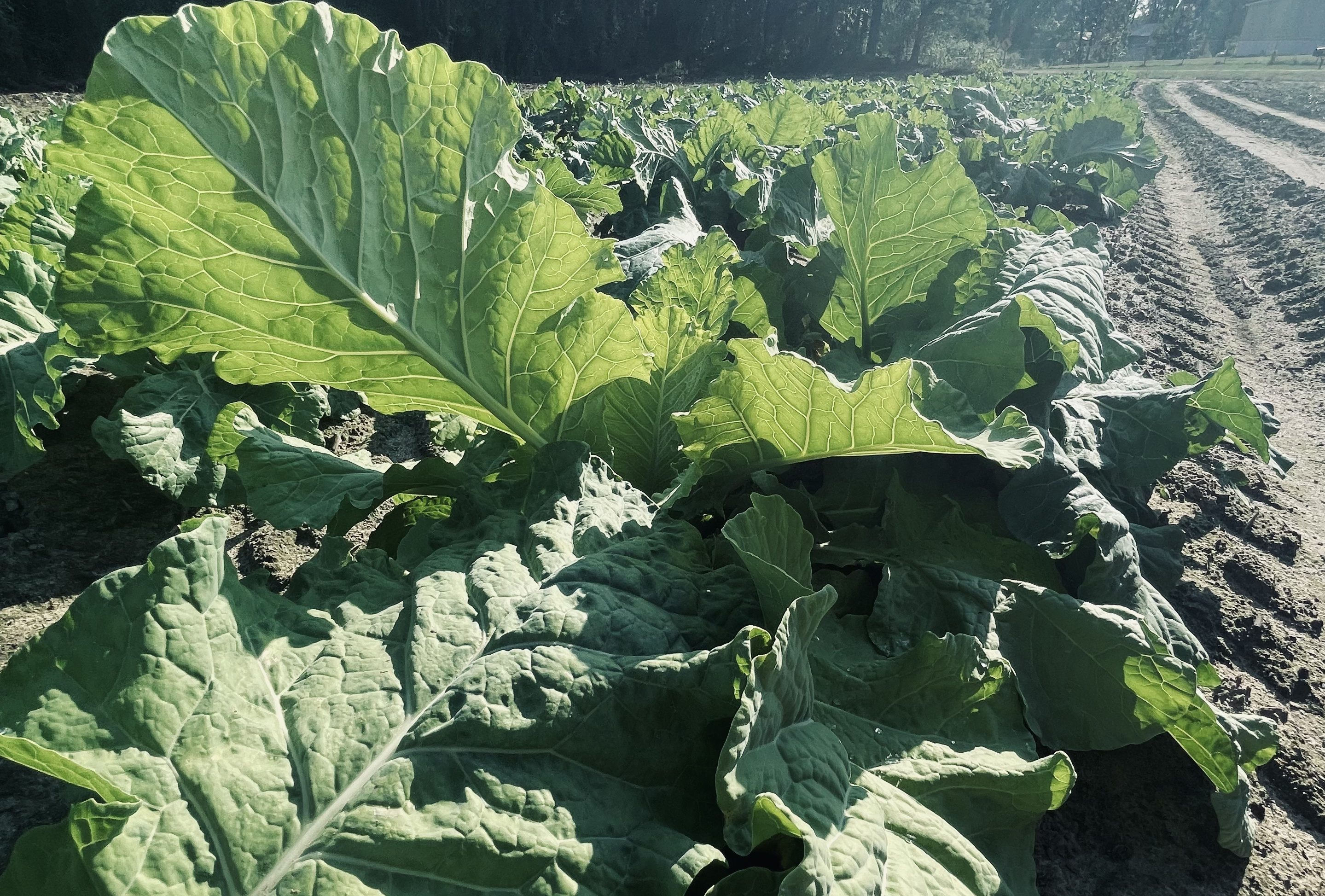I’m pretty sure I learned more about church at a barbecue pit than I did at seminary.
When I was 12 years old my father, also a United Methodist minister, was appointed to Ebenezer United Methodist Church in Raleigh, NC. It was probably the best thing that happened to my family when I was growing up. To this day I still consider Ebenezer my home church, my family. And Ebenezer was known throughout the area for one thing: barbecue.

I’ve lived in eastern North Carolina my entire life. I don’t want to live anywhere else. Eastern North Carolina and its people take great pride in our barbecue. For those poor souls who may not be familiar, let me catch you up to speed. Oftentimes barbecue is defined by its sauce, and so eastern NC barbecue is, on the surface, set apart because of our vinegar sauce. This differentiates us from western NC barbecue with their ketchup sauce, or South Carolina barbecue with their mustard sauce, or Alabama with their white sauce, or Memphis with their thick, sweet sauce slathered thick on ribs. But I’m here to tell you right now: the secret ain’t in the sauce. At least, not entirely.
Real, traditional eastern North Carolina barbecue is whole hog barbecue. The entire pig, split down the middle and put up on the cooker. It takes a long time to cook a pig like that. We’re talking all day or, quite often, all night. Once the pig is cooked, the meat is pulled off the bone and chopped- preferably by hand- into small morsels. During this time all of the meat is mixed together- the shoulders and hams, the loin and belly, the dark meat and the light meat and even the good, crispy skin if you’re doing it right, all together into one glorious mound of meat before the sauce- a thin mixture of vinegar, salt, and secrets- is poured over top (just a little bit, you can add more at the table if you want). The whole thing is mixed together and served, and when it is done right, when it is done with love, you will never find better barbecue.
That kind of barbecue, that kind of goodness unleashed on the world, takes time and it takes teamwork. I have cooked many a pig in my life, but I’ve never once done it alone. It is at bare minimum a two-person job. This takes me back to Ebenezer barbecue.

Churches all across eastern NC have held barbecue fundraisers, but I don’t believe any have been on the scale of Ebenezer. The first barbecue was held in 1950’s, and by the time we came along in the mid 1990’s, Ebenezer was cooking between 80 and 100 whole hogs over two days, and selling it all in one day. We were not a big church. The average attendance might have been 100. A fundraiser of such magnitude required all hands on deck, and every year we pulled it off.
Everyone showed up. Everyone did their part. We’d get to the barbecue pit well before sunrise on Wednesday and Thursday to put the pigs on the cookers. Those who had to go to work or school would, but we’d all return in the middle of the afternoon. We’d do whatever needed to be done: pulling the pigs off the grills, carrying the tubs of meat into the chop house, chopping it, making sauce, picking out gristle, mixing the sauce with the meat, packing it into the coolers. On Friday we’d find our places reheating the barbecue on gigantic double boilers, frying hush puppies, dishing out potato salad and slaw, cutting desserts, waiting tables, packing to-go plates, driving out and making deliveries. It was three days of hard work, and everyone did their part. We all worked together, side-by-side, laughing and sweating and chatting, giving of ourselves because it was for the Church. But it was so much more than a fundraiser. Don’t get me wrong, it brought in a lot of money and covered a lot of expenses. But I don’t think we would have kept it up, I don’t think we would have worked that hard, I don’t think we would have made that kind of effort, just for money. No, working together like that built us up as a community, as a family who knew each other and loved each other even when we were sick and tired of looking at (and sometimes smelling) each other. This is one of the things I love about whole hog barbecue: it’s a community event.
Eastern NC whole hog barbecue originally came about as a celebration, a get together of neighbors and farm hands at the end of a long, hard season. It was an event to bring in the folks you hadn’t seen in a long time and the folks you were sweating in the field with yesterday. It took all day or all night to cook, but being together with these people, learning to know and love these people better, was worth the effort.
At our church barbecue, while the pigs were cooking the old men sat around and talked. These were not divinity scholars. These were men who could not define atonement theory or soteriology. These were men who spent their whole lives working hard. They had accomplished many great things, and they had lost a great many things. They had seen war and hunger, they had seen feasting and revelry. I can’t repeat most of their stories and jokes from the pulpit. We never discussed theology other than when someone would testify, “The Lord has been good to me,” and we would all agree. Because the Lord has been good to us. These were men who would give you the shirt off their backs if you needed it, and many of them had done so numerous times. These are men who never questioned where you’ve been or what you’ve been up to or why you haven’t been in church. In order to belong, all you had to do was show up and join in. I miss those men. I miss those hard-working days.

In all likelihood, Eastern NC barbeque is the oldest style of barbecue in America. If you trace it through the last few centuries you will find its history on the farms and tobacco markets of my home state… and you’ll also find its roots in the slaves ripped from their homes in Africa and taken to the Caribbean and then onto American shores, forced to labor long and hard and hot under threat of pain and death. The style of cooking whole animals long and slow over coals in the ground was taught to us by enslaved Africans. Well after the slave trade was ended and slavery itself done away with, well after barbecue came to be a staple of our cultural life and a source of pride, it was still tinged with division and segregation. The pitmasters at many well-known barbecue restaurants were not permitted inside to eat there.
It’s a funny thing that this food that I know and love so well, this food that I have such an intimate connection with, this food that my state takes so much pride in, has such a dark history. But that’s how this world is. As much as we might want strict lines and boundaries between good and bad, there’s an awful lot of gray area. A lot of good things end in tragedies, and a lot of tragedies lead to good things. It’s a mixed-up world. We laugh and we cry, we hurt others and are hurt by others, we bind up wounds yet refuse to acknowledge their presence, we yell and scream and often realize only too late we yelling and screaming into an echo chamber. How do we handle that? How do we bring about justice and righteousness in this world when we can’t even agree on what justice and righteousness are?
All I know to do is to practice the theology I learned at the barbecue pit: show up and work, all of us, together. Do your part, whatever that part is, because everyone else is depending on you. Sweat together. Talk together. Laugh together. Learn to know and love each other until doing the work together is more important than the pain in your back and feet and arms.
Then sit down together with a plate piled high from the work you all have done, and taste and see that the Lord is good.
Though the Lord might be better with just a little more of that good vinegar sauce.
[If you enjoyed this post, please subscribe to my blog and/or follow me on Facebook for more. New posts come out every other Wednesday.]










My husband and I are members of Crossroad UMC in Portsmouth ,VA. We do alot of barbecue cooking for church functions. We cook competition pork shoulders usually 10 to12 pounds. We normally serve between 50 to 75. We are a small church too. We cook alot of things on our grills. We enjoy it.
LikeLike
I am a retired pastor from Texas and the first time I ordered barbecue in North Carolina I tried to send it back because I didn’t think it was barbecue but after three years at Duke I learned to love it. I also enjoyed being with the men as they cooked the pig. It’s just a lot different from Texas barbecue.
LikeLike
I miss those hard-working days, too. (We Yankees did Sugar on Snow and Roast Beef Suppers and Strawberry Festivals). But I think that for most churches, those days are over, for all the cultural reasons we have all heard. The question is, what WILL we do together that will build the Body of Christ? What will get folks together in those folding chairs to tell the old, old story of Jesus and Love? Always searching…
LikeLike
I grew up in Ebenezer. Enjoyed your story. I remember the days in the 50’s when I was a little girl helping with the potato salad with my Mother and Mama
LikeLike